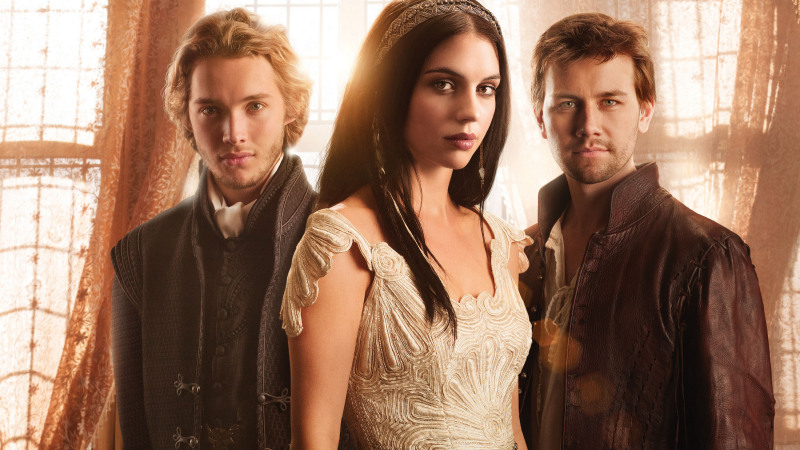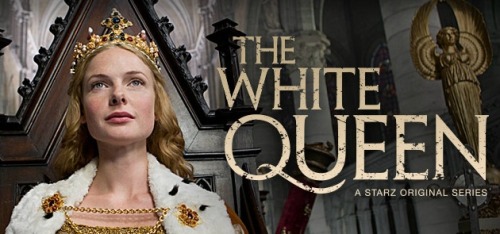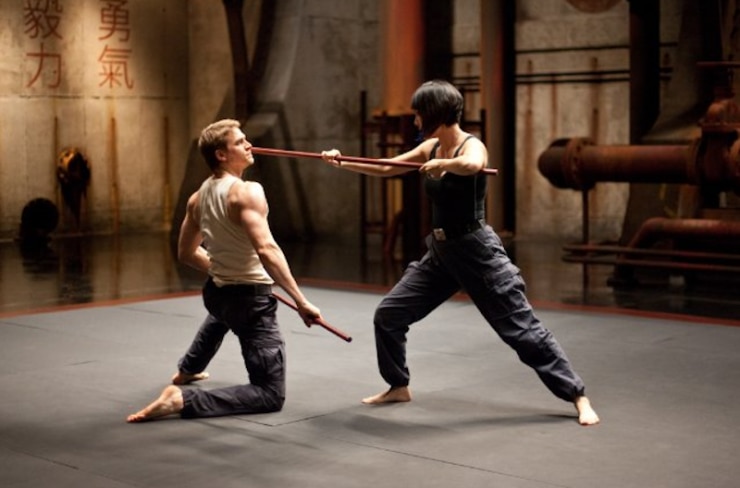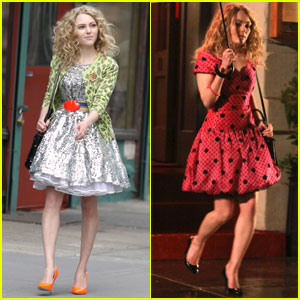Monday, December 2, 2013
Friday, November 1, 2013
Our Dolls, Ourselves? The History of the American Girl Company
"In July, American Girl announced that it would “archive” Molly, one of
the original three characters, as well as Emily, her “best friend,”
introduced in 2006. There’s no specific retirement date set, but they’ll
likely be gone by the end of this year, Julie Parks, a spokesperson,
told me. Molly’s journey to the big doll box in the sky means that none
of the earliest three dolls introduced by the manufacturer that launched
the American Girl brand, Pleasant Company, will be available. (Samantha
was retired in 2009, Kirsten in 2010.) Felicity Merriman, introduced in
1991, has also been archived. Addy Walker is the only character from
Pleasant Company’s first ten years of existence that remains in active
circulation."
Friday, October 25, 2013
LINKSTORM: Reign and the Female Masturbation Controversey
Reign courted controversy during it's pilot with a scene where one of Mary Queen of Scots, or as I will now and forever refer to her on this show, Mary Teen of Scots. This contraversey is not about the show's historicity (which is almost nil, though it is watchable despite, or possibly because of it's extremely loose relationship with facts and period)
The controversy centered on the decision to cut a scene where a fully clothed teenage lady-in-waiting masturbates in a hallway. This is despite some pretty violent poisonings and beheadings, and a fairly racy sex scene with nudity (network tv nudity) that did make the final cut.
The internet has thoughts, What are Yours?
The CW's racy new period drama Reign received criticism last week after the network edited out a female masturbation scene but allowed several other equally explicit scenes to air. In the original, the teen in question and her peers get all hot and bothered after witnessing a bedding ceremony. She finds an empty stairwell and decides to quite literally take matters into her own hands... Singling out female masturbation for censorship gets even more absurd when you consider the graphic stuff on television that is streamed every day without controversy. Consensual, stylized sex scenes between two attractive, heterosexual characters are so abundant they're hardly worth mentioning. And sexual violence is incredibly prevalent in primetime; it is the central premise of shows like Law and Order SVU and CSI, which week after week churn out episodes focused on rape, abduction, and violence against children. [The Week]
 "Voyeuristic sex, prolific
infidelity, a teenage girl seduced by a grown man — Reign. So too are scenes of extreme violence, including one featuring a decapitated head spewing blood these things are
tame enough for the CW's period drama. But a young woman masturbating? Good heavens, no." [Salon]
"Voyeuristic sex, prolific
infidelity, a teenage girl seduced by a grown man — Reign. So too are scenes of extreme violence, including one featuring a decapitated head spewing blood these things are
tame enough for the CW's period drama. But a young woman masturbating? Good heavens, no." [Salon]
"This is not about slamming TV-decency advocates as prudes. If you're
against the depiction of sex on TV altogether — particularly on a
network aimed largely at teens — fine; I may not agree with you but
that's a consistent position and your prerogative. But the idea that
masturbation is somehow dirtier and more outrageous than full-on sex is
absurd." [TIME]
I can't promise to review every episode, but I will be watching, anyone who wants to join me should hit me up at @Caitlin_Burns on twitter and we can snark together.
Monday, October 21, 2013
Slutoween 2013: Take Back Halloween
So, I usually do a roundup of inappropriate Halloween Costumes, or a roundup of roundups of such costumes, but this year I simply cannot be bothered. Also, SPOILER they're all Sexy Walter White (unless you're a Marvel GIRL!)
Instead, be inspired by:
Instead, be inspired by:
Take Back Halloween
Girls Toys are Raising Toy Company's Profits By Leaps and Bounds
"Boys' products sales, the biggest category by revenue, fell 17% in the latest quarter to $392 million. The games category's sales improved 5.9% to $387.5 million, while sales in the girls' category climbed 29% to $388.7 million."
Hasbro's Earnings Rise on Improved Sales of Girls Toys
Thursday, October 10, 2013
Sexualized avatars affect the real world, Stanford researchers find
"A Stanford study shows that after women wear sexualized avatars in a
virtual reality world, they feel objectified and are more likely to
accept rape myths in the real world. The research could have
implications for the role of female characters in video games."
-Read more at Stanford News
Thursday, October 3, 2013
Is This the Grossest Advertising Strategy of All Time? -The Atlantic
A new study claims to identify the times of the week that women are feeling the most insecure about their bodies, and recommends that brands "concentrate media during prime vulnerability moments."
Read more at The Atlantic
Thursday, August 22, 2013
Ode: Everything I know I learned from Pepper Ann
"...while it’s true that the Network-television animators who decorated my
childhood probably weren’t conspiring to subliminally raise an army of
(one?) young feminists, the shifting narrative trends point to a greater
societal transformation. That can’t be a coincidence, can it?"
- Read more at Jezebel
- Read more at Jezebel
Monday, August 12, 2013
Tuesday, August 6, 2013
Barbie's "Career of the Year": Mars Explorer
Mattel and NASA Team up to create Mars Explorer Barbie, FINALLY a second doll to play with my daughter's Sally Ride Barbie. Pink or no pink, I could still sleep at night if I bought it for my daughter.
I want to be excited for The White Queen, so I've decided I will be.
 While some might say, isn't this a derivitive game of thrones? just like Da Vinci's Demons was a derivative Borgias (or Assassin's Creed?). That's a fair critique I suppose, but for me personally, I'm a fan of getting multiple perspectives on a story. It's what I've based entire career on the appeal of being able to provide a grander narrartive context in different stories. So, it's compelling to see these historical periods explored from different artistic visions. Especially when they're done well.
While some might say, isn't this a derivitive game of thrones? just like Da Vinci's Demons was a derivative Borgias (or Assassin's Creed?). That's a fair critique I suppose, but for me personally, I'm a fan of getting multiple perspectives on a story. It's what I've based entire career on the appeal of being able to provide a grander narrartive context in different stories. So, it's compelling to see these historical periods explored from different artistic visions. Especially when they're done well. The fact that the series follows three women negotiating halls of power is quite compelling, and if they only reason you tune in is because Game of Thrones is in the off season and you're mildly inspired to see something about The War of the Roses, hopefully it'll keep you inspired long enough to stay tuned. The fact that there is material that is determining the throughline of miniseries from Philippa Gregory’s War of the Roses trilogy may bode well for the conhearance of its story-arcs.
I have enjoyed Starz forays into long-form drama thus far, and hold a lot of hope for their ability to bring this female-led drama to life. Hopefully inspiring more creators in its wake.
Friday, July 26, 2013
What it takes to make it as a modern female pop star
"At first glance, I didn't realize the most notable thing about the
video, as I was totally distracted by McKee's very bright candy-colored
hair: it's that she actually wrote every song she was performing.
"Hold It Against Me." "Teenage Dream." "Dynamite." "Last Friday Night
(T.G.I.F)." "Part Of Me." "C'Mon." "California Girls." "Wide Awake.""
- Jezebel
- Jezebel
Thursday, July 18, 2013
It's a Man's Man's Man's World- METRO
Nikki Baughan, editor of MovieScope
magazine, said Pacific Rim was in bad company at the box office this
summer, with films such as Man Of Steel, The Great Gatsby and World War Z
all incapable of meeting the three Bechdel criteria.
‘Yes, they have female characters in them – indeed, striking characters like Daisy Buchanan, Mako Mori and Lois Lane – but they all fail the test for one reason or another,’ she told Metro.
‘Unfortunately, these women are not independent characters in their own right, but designed to interact with and support the males around them...’
‘If girls grow up without seeing strong female characters on screen – leaders, engineers, scientists – it has a very real impact on how they see their place in the world,’ she said. ‘It’s a vicious circle and the Bechdel test is an important tool for highlighting this problem. The Bechdel test acts as a magnifying glass; by breaking down a film in these simple terms, it draws attention to the shocking gender disparity that exists in the majority of cinematic narratives. The Bechdel test isn’t intended as a mark of quality, rather of gender diversity within a narrative.’
The problem lies on the other side of the camera. According to research carried out by the University of Southern California, just one in six of the directors, writers and producers behind the 100 top-grossing movies at the US box office last year were female.
‘Women are under-represented in English language films, but it’s not surprising when you look at the dominance of men behind the camera,’ said film writer Stuart Barr, a contributor for movie websites Screenjabber and Chris And Phil Present.
Baughan added: ‘Male screenwriters write from their own perspective and experiences and that usually – though not always – results in female characters that are either absent or entirely unsatisfactory. It’s a sad fact that, for various reasons historical and financial, the mainstream film industry remains the enclave of the straight, white, middle-class male.’
Read the rest of the Metro article at The Bechdel Test and why Hollywood is a Man's, Man's, Man's World
‘Yes, they have female characters in them – indeed, striking characters like Daisy Buchanan, Mako Mori and Lois Lane – but they all fail the test for one reason or another,’ she told Metro.
‘Unfortunately, these women are not independent characters in their own right, but designed to interact with and support the males around them...’
‘If girls grow up without seeing strong female characters on screen – leaders, engineers, scientists – it has a very real impact on how they see their place in the world,’ she said. ‘It’s a vicious circle and the Bechdel test is an important tool for highlighting this problem. The Bechdel test acts as a magnifying glass; by breaking down a film in these simple terms, it draws attention to the shocking gender disparity that exists in the majority of cinematic narratives. The Bechdel test isn’t intended as a mark of quality, rather of gender diversity within a narrative.’
The problem lies on the other side of the camera. According to research carried out by the University of Southern California, just one in six of the directors, writers and producers behind the 100 top-grossing movies at the US box office last year were female.
‘Women are under-represented in English language films, but it’s not surprising when you look at the dominance of men behind the camera,’ said film writer Stuart Barr, a contributor for movie websites Screenjabber and Chris And Phil Present.
Baughan added: ‘Male screenwriters write from their own perspective and experiences and that usually – though not always – results in female characters that are either absent or entirely unsatisfactory. It’s a sad fact that, for various reasons historical and financial, the mainstream film industry remains the enclave of the straight, white, middle-class male.’
Read the rest of the Metro article at The Bechdel Test and why Hollywood is a Man's, Man's, Man's World
Monday, July 1, 2013
"I Was a Manic Pixie Dream Girl" - New Statesman
"I’m fascinated by this character and what she means to people, because the experience of being her - of playing her - is so wildly different than it seems to appear from the outside. In recent weeks I’ve filled in
the gaps of classic Manic Pixie Dream Girl films I hadn’t already sat
through, and I’m struck by how many of them claim to be ironic
re-imaginings of a character trope that they fail to actually
interrogate in any way. Irony is, of course, the last vestige of modern
crypto-misogyny: all those lazy stereotypes and hurtful put-downs are
definitely a joke, right up until they aren’t, and clearly you need a
man to tell you when and if you’re supposed to take sexism seriously. "
 Read this article, and if you REALLY want to be disturbed watch Ruby Sparks.
Read this article, and if you REALLY want to be disturbed watch Ruby Sparks.
 Read this article, and if you REALLY want to be disturbed watch Ruby Sparks.
Read this article, and if you REALLY want to be disturbed watch Ruby Sparks. Thursday, June 6, 2013
Tiger Eyes Premieres this Weekend
The first Judy Blume book to ever see the silver screen opens this weekend, are you going to see Tiger Eyes?
from Tashmoo Productions on Vimeo.Monday, May 20, 2013
Women didn't Abandon Rom-Coms, Rom-Coms abandoned Women
The Jezebel takes on the question of "What happened to the Rom-Com?
"1986 to 1988, the dawn of a Golden Age for Rom-Coms. Moonstruck and Working Girl were both major hits, and the genre sold $1.6 billion in tickets over three years (adjusted to 2012 dollars, as are all figures in this article). This was followed by When Harry Met Sally... (1989), Pretty Woman (1990), and Sleepless in Seattle (1993), all of which topped $170 million. In two of these films, the sole protagonist is a woman. Two more were written and directed by Nora Ephron. That leaves Pretty Woman, where Julia Roberts stole the fucking show. Plenty of men saw these movies–you can't win the box office by excluding an entire gender–but these films were undeniably aimed at a female audience."
Wednesday, May 1, 2013
The Lizzie Bennet Diaries and the Power of Transmedia
"The Lizzie Bennet Diaries is a modernized transmedia adaptation of Jane Austen’s Pride and Prejudice, told in the form of a video blog kept by
24 year-old grad student Lizzie Bennet. Lizzie’s vlog sets out to
document the ups and downs of a young woman struggling to figure out
where she fits in the world, along with her best friend Charlotte Lu and
her two sisters, excessively nice Jane and wild child Lydia. And
shortly after the videos begin, a young handsome medical student named
Bing Lee moves to town. The show began in April of 2012 with two videos
a week posted at Lizzie’s YouTube channel. The characters also had their own Twitter, Facebook and Tumblr accounts where they would talk to each other, and the fans."
Monday, April 29, 2013
Link: Why It's Time to Retire the Manic Pixie Dream Girl
"As long as men have
written female characters, entertainment has been packed with girls
whose individuality is just a means for some tiresome hero to work out
his own ennui. From William Shakespeare's Juliet Capulet to Truman
Capote's Holly Golightly, the characters' uniqueness was like an
ideological rib-eye that the down-on-his-luck hero could feast on to
thrive and prosper in his own life. These idiosyncratic muses were
finally given a common name in 2007: The "Manic Pixie Dream Girl" — and now, in 2013, it's time to put the term to rest."
Friday, April 26, 2013
The Sage Dowager
Lady Olenna and The Dowager Countess the Sage voices of reason in our favorite shows.
It's great to see some serious screentime given to women who fit into the sage archetype, like Yoda or Gandolf but in corsets (ok, maybe we could all do without corsets). But there's a whole chapter on that to write, oh wait! it IS a chapter I'm writing...
It's great to see some serious screentime given to women who fit into the sage archetype, like Yoda or Gandolf but in corsets (ok, maybe we could all do without corsets). But there's a whole chapter on that to write, oh wait! it IS a chapter I'm writing...
Friday, April 19, 2013
Context Artist: Createasphere's Transmedia Coalition
Remember my column over at Createasphere's Transmedia Coalition? Well, It exists!
Check out my new article:
The Producer as Serial Entrepreneur
Monday, April 15, 2013
An AI Feels More Human than I Do: Kotaku on Bioshock Infinite
Kotaku's Commentary on BioShock Infinite (which includes spoilers) talks about the dehumanization of players in games, and how play parameters reveal and reenforce inhumanity in the FPS world.
"I'm supposed to run after her. That's not what I do. Instead, I look around me and loot what I can—Elizabeth will wait. What if I miss something by running after her right away? Sure enough, I would have...
The design, which rewards exploration, is at odds with the narrative, which makes you care about Elizabeth. Worse, the design makes me feel ashamed for being unable to resemble a normal human being in a game—because if it was real life, there's no way I'd stop and ransack everything before running after Elizabeth!"
Tuesday, April 2, 2013
Monday, March 25, 2013
Monday, March 18, 2013
Big Announcement: Context Artist at Createasphere
Dear Readers!
I've now been given a column at Createasphere's Transmedia Coalition which is a fantastic blog comprised of 10 experts in narrative, business and production in the space. I'm extremely excited to be among them and to be a part of the Createasphere Community.

What does that mean for you dear readers? Will I stem the tide of rants and rambles here? Possibly. But probably not.
What this means is that I'll be posting there regularly, and when it's topical for this blog, I'll definitely link here. But when I see something that might be more personal or ranty, I'll still post it here if it doesn't exactly match up with the pro-tips context of transmedia storytelling that the Transmedia Coalition is going to be about. So, if you want to see more of my thoughts on the business of transmedia storytelling, emergent business models and distributed communciations systems, be sure to ALSO follow over at Createasphere, but still check in here for your regularly highly unscheduled thoughts on media directed at women and girls.
So, in response to Beautiful Creatures? How Did I Miss This? my first post over there is:
"Hollywood has a number of YA novel-based properties slated for release in 2013 (Mortal Instruments, The Host) green lit at the apex of fan clamor for Twilight and The Hunger Games. What can be done to help these projects meet better fates?"You can always check on my twitter feed where I'll post it all: @Caitlin_Burns
Link: Beyond Bodice Rippers
The Atlantic's Beyond Bodice Rippers: How Romance Novels Came to Embrace Feminism is a solid read. While Twilight and 50 Shades of Grey place romantic power in masculine hands and the woman as supplicant, there is a great variety of material in the Romance Genre that is about Women taking Action.
"Heroines making choices are critical for feminist romance authors. Dryden says that she, like MacLean, writes heroines who make choices, 'even if the choices available to her are limited by convention or circumstance. She acts, rather than be acted upon.'"
"Heroines making choices are critical for feminist romance authors. Dryden says that she, like MacLean, writes heroines who make choices, 'even if the choices available to her are limited by convention or circumstance. She acts, rather than be acted upon.'"
Thursday, February 14, 2013
Beautiful Creatures? How did I miss this?
In today's edition of "I suppose I really can't be everywhere at once" Beautiful Creatures is coming out.
Maybe it's that I have been loath to start a new non-steampunk mythical creature romance franchise since the whole Twilight Era, but to be entirely fair, when it's done well, they can be my absolute favorite thing.
That said, I'll be checking out Beautiful Creatures now, in part because there seem to be some pretty heady opinions in the press about it not being awful.
Beautiful Creatures is what Twilight would be if it were awesome
at io9.com
Beautful Creatures Review by Variety
Maybe it's that I have been loath to start a new non-steampunk mythical creature romance franchise since the whole Twilight Era, but to be entirely fair, when it's done well, they can be my absolute favorite thing.
That said, I'll be checking out Beautiful Creatures now, in part because there seem to be some pretty heady opinions in the press about it not being awful.
Beautiful Creatures is what Twilight would be if it were awesome
at io9.com
"Everything you hated about Twilight — the bad dialogue, the sappy scenarios and drippy characters, the eye-rolling politics — is made right in Beautiful Creatures. This flick is a supernatural high school romance full of teenagers who talk like real human beings and make decisions that aren't entirely stupid. And yet it's still a terrific, fun flight of fancy about witches, ghosts of the Civil War, and a small southern town where church ladies fight librarians for the souls of the young. This is the movie you never expected to like — but you probably will. "
Review: Beautiful Creatures (2013) Is Almost Fantastic
Over at the Huffington Post Of course, for everyone who likes YA Paranormal Romance (lol publishing genre titles) there are plenty who don't. But does their distaste means the movie is bad?"The film paints an evocative picture of life in a dead-end fundamentalist American small town and is unapologetic about depicting some unpleasant sides of religious fundamentalism. But while the film outright soars when it focuses on character and human interaction, it cannot withstand the weight of its own overly contrived mythology. The deeper the film gets into its central conflict the more of a mechanical plot exercise it becomes. So superb is the first two thirds of Beautiful Creatures that I felt genuine disappointment when the film flubbed the landing, ending itself in the territory of merely 'very good.' "
Beautful Creatures Review by Variety
"The film ultimately plays like so much teenage girl poetry, heavy on the angst, endearingly naive in its notions of love and yet brought vividly to life by a game cast, evocative locations (both indoors and out) and stunning anamorphic lensing. Louisiana works nicely for Civil War-obsessed Gatlin, suggesting a tween-friendly 'True Blood.' "Beautiful Creatures Review from Rolling Stone
"When Lena hits her 16th birthday she'll be called to fight with the light side or the dark side. It's a bigger yawn than it sounds. As supernatural types, Oscar winners Jeremy Irons and Emma Thompson overact so strenuously and with such outrageously awful Southern accents that you fear the damage this crock may do to their reputations. Bukowski would have puked. I know I did."
Are the critiques of the movie's story going to get in the way of new audiences (non book readers lets say) enjoying and getting into the world? Can you love it if your heart isn't already open to Mississippi Witch Teen Drama? I will let you know what my thoughts are when the movie is released to the public.
The books authors weighed in in an interview with TIME that is probably worth reading for posterity, they're stating that they tried to respect the teen audience more than other books of the genre as intelligent and reasonable... did they deliver?
"We wanted to write a story about strong girls, because they were strong girls. We wanted to write a story about claiming yourself, owning who you are, being the person that you are, accepting who you are. Because not only did we see them trying to do that, but we weren’t brave enough to do that when we were their age. They were much braver than us. And it was like us cheering them on."
Monday, February 11, 2013
The Curse of Minority Feisty
"If you see an animated film today, it’s likely to include a token strong female character or two who reviewers will call “feisty.” In “How to Train Your Dragon,” Astrid; in “Toy Story,” Jessie; in “Ratatouille,” Colette. She’s supposed to make us feel like the movie is contemporary and feminist, unlike those sexist films of yesteryear."I cannot tell you how much seeing "feisty" in a script turns me off. As, Reel Girl, and Jezebel point out Girls are underrepresented on screen on TV and film, and those secondary characters are often given the same "personality".
What girls I've seen in most scripts fall into two categories overall:
"Pretty" The Love Interest, The Ingenue, the Delicate impossibly unattainable feminine ideal, painted pink and flowery. And of course it's more grown up "Sexy" which is a term of age, rather than any real difference in character attitudes usually.
Or, the Feisty Girl.
The Feisty Girl is more modern, she would pick red over pink and feisty tends to be code for "competent female with positive qualities of modern womanhood" but, to be honest, boiling all of that down to one adjective is as unproductive as the other stereotypes of ages past.
It's lazy. The largest issue that I come across in characterization is laziness. Take the time to develop your characters, male or female. The problem appears more relevant when we talk about female characters in aggregate because female characters are more often than not, secondary.
Every time you see a "feisty" girl, she's almost an afterthought, Feisty is a grab bag and it's not as useful as it's overuse wants it to be. When you're picking adjectives, try and pick 3 that are unusual.
Let's do that for a start.
Next time you're writing a script, if you want to describe your characters as "Pretty", "Sexy", or "Feisty." Stop for a moment, and open a thesaurus. Find the other adjective that best colors the character you're writing then use that instead.
It wouldn't take that more time, and would propel character development ahead by leaps and bounds.
Friday, February 8, 2013
The Carrie Diaries: Let Hate-Watching Be the Judge
While The Carrie Diaries has had 4 episodes, the response is notably tepid.
Rumors of Cancellation, tepid.
This story world extension of Sex in the City had already alienated some important gatekeepers to the fan community it's seeking by changing some pretty major elements of Carrie Bradshaw's back story. The "disrespect" for the source material even alienated the major league of hate-watching at New York Magazine, and if they disdain to snark at you you're in trouble.
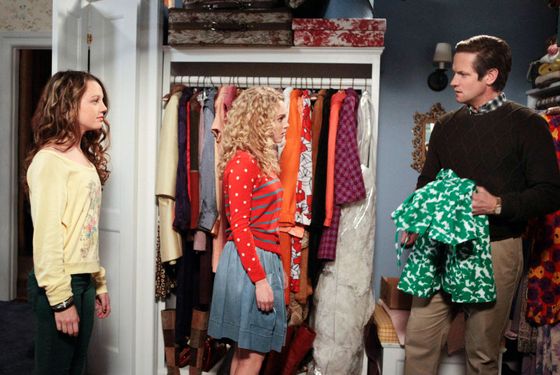 More than marketing, understanding what your audience loves, or at least what brings them joy about something is essential to crafting an experience they'll invest their time in. For a show like Sex and the City, there was the idea that "water-cooler conversation" equated to "girls night chatter" or "4 Cosmo brunches." This is what hate-watching is, the more open, more public review of your project and the honest assessment of the people who love your show most. If you can't even inspire that, you genuinely need to rethink why you're doing it.
More than marketing, understanding what your audience loves, or at least what brings them joy about something is essential to crafting an experience they'll invest their time in. For a show like Sex and the City, there was the idea that "water-cooler conversation" equated to "girls night chatter" or "4 Cosmo brunches." This is what hate-watching is, the more open, more public review of your project and the honest assessment of the people who love your show most. If you can't even inspire that, you genuinely need to rethink why you're doing it.
If your show doesn't inspire people to be funny, and excite people to talk about it, it's already dead.
If you want to see what the triumphant eviscerating hate-watching could be/have been, I've included two sources you might/might have enjoyed tuning in for:
From Jezebel: "We Watched the First Four Episodes of The Carrie Diaries so You Don't Have To."
While it's largely the same critique one can apply to the Sex and the City movie sequels, the franchise doesn't feel like the stories are more than "Brand Extensions". Rather than the organic growth of an interesting story world. Maybe it's the length between extensions, can the creators capture the enthusiasm of the first stories that were so much of a moment and so specific to the zeitgeist of that time? My job being to help creators find that core and extend it I can't help but feel like they lost track of their themes, never defined them explicitly for themselves and are having a terrible time understanding what timeless elements would apply to any story in their world.
Did anyone read the book? Is it reflected in the series? I suppose that's my next assignment here. I'll let you know when I'm done. If you want to read it with me in the Mystery of Girls' Media Book Club, hit me up on Twitter @Caitlin_Burns
Rumors of Cancellation, tepid.
This story world extension of Sex in the City had already alienated some important gatekeepers to the fan community it's seeking by changing some pretty major elements of Carrie Bradshaw's back story. The "disrespect" for the source material even alienated the major league of hate-watching at New York Magazine, and if they disdain to snark at you you're in trouble.
If your show doesn't inspire people to be funny, and excite people to talk about it, it's already dead.
If you want to see what the triumphant eviscerating hate-watching could be/have been, I've included two sources you might/might have enjoyed tuning in for:
From Jezebel: "We Watched the First Four Episodes of The Carrie Diaries so You Don't Have To."
Entertainment Weekly, Bless their Hearts, also gave it the old college try, but much like the rest of the world, doesn't seem to be able to pull it together enough to care about the show."Being something of a professional Sex and the City-eviscerator, I fully planned to watch the premiere of The Carrie Diaries and offer hella bon mots about peplum skirts and Samantha's future-vulva. But then, you know, life and not-caring got in the way, and now we're four episodes in and there are already rumblings about cancellation! And I haven't even figured out yet whether or not I should care! As ratings have been rather dismal, it seems as though most of you haven't figured it out yet either. But don't worry. I'm on it. Below, you'll get the dirt on everything that has happened so far.
"So basically we find Carrie Bradshaw living in Castlebury, Connecticut with her dad Tom (Matt Lescher) and her younger sister Dorrit (Stefania Owen). Side note: what kind of name is Dorrit? It doesn’t really blend with Carrie. I feel like her sister’s name should be like Kathy or Paula or Megan. It’s kinda like when my youngest brother was born and I wanted to name him Taylor or Connor or something jazzy and my parents were like, “Those don’t really fit with Tim and Ryan” (we eventually chose Matt). Also, Dorrit is real goth and apparently likes taking Carrie’s things, like their dead mother’s patent leather purse. "I wish this show inspired more excitement, even within the narrow boundaries of its demographic requirements or the frame of the Sex and the City franchise. It just doesn't feel like it has, or has found its heart. It's thoroughly generic despite having a brand identity with a strong essence it could have drawn from.
While it's largely the same critique one can apply to the Sex and the City movie sequels, the franchise doesn't feel like the stories are more than "Brand Extensions". Rather than the organic growth of an interesting story world. Maybe it's the length between extensions, can the creators capture the enthusiasm of the first stories that were so much of a moment and so specific to the zeitgeist of that time? My job being to help creators find that core and extend it I can't help but feel like they lost track of their themes, never defined them explicitly for themselves and are having a terrible time understanding what timeless elements would apply to any story in their world.
Did anyone read the book? Is it reflected in the series? I suppose that's my next assignment here. I'll let you know when I'm done. If you want to read it with me in the Mystery of Girls' Media Book Club, hit me up on Twitter @Caitlin_Burns
Link: Yes it's 2013, Pop Star Shaves head for Shaming Girl Group by having Boyfriend
The Atlantic Lays it Out:
"The official YouTube channel of AKB48, the most popular musical group in Japan today, usually hosts music video clips and other promotions. Yet around 10 p.m. on January 31, a clip unlike anything ever posted there popped up. Minami Minegishi, a popular member of AKB48 since the group's founding in 2005, faced the camera and apologized profusely to fans. As tears washed over her face, she said those in charge of the group had demoted her to the "trainee" team and, to punish herself, she had shaved her head. Her transgression: being caught leaving a young man's apartment several days earlier."
"The official YouTube channel of AKB48, the most popular musical group in Japan today, usually hosts music video clips and other promotions. Yet around 10 p.m. on January 31, a clip unlike anything ever posted there popped up. Minami Minegishi, a popular member of AKB48 since the group's founding in 2005, faced the camera and apologized profusely to fans. As tears washed over her face, she said those in charge of the group had demoted her to the "trainee" team and, to punish herself, she had shaved her head. Her transgression: being caught leaving a young man's apartment several days earlier."
 |
| The Jury of her Peers. |
What You Need to Know: Smash Begins Again
 |
| Season 1 Marketing |
.jpg) |
| Season 2 |
This show has become one of the most vibrant "Hate-Watch" Shows in recent memory. This has inspired a spate of quite interesting commentary on the phenomenon and the show itself.
"Hate-watching is the act of watching a show that you claim to dislike with the sole purpose of mocking it. With the recent return of Smash, a highly mockable melodrama about the behind-the-scenes happenings of a Broadway production, hate-watching seems to be a hot button term in TV writing, but is hate-watching even a real thing? Or do we just refuse to admit that we like shitty things?"
Jezebel took on the question of Hate-Watching
I for one love the snarky critique of a piece of work often more than the work itself. I couldn't do my job if I couldn't find ways to enjoy things that aren't masterpieces. New York Magazine's Gossip Girl Recaps (With New York Reality Indexing) got me through seasons 1-6 and made the show required watching so that I would at least be in on the best jokes.
This type of watching is genuinely social in a way that is very modern. The question of whether or not you like a show is almost immaterial if you LOVE the conversation around it and it brings you joy. And Lord does gossiping about fictional characters bring joy. The trouble is, sometimes stories are bad, sometimes they're so bad their good, and sometimes they're genuinely awful and defy even ones ability to mock them. The Internet helps, there are some gifted comedians out there who could mock the least compelling things imaginable and be charming, but that isn't something that necessarily means that it should be an aspiration for a show to be Hate-Watched.
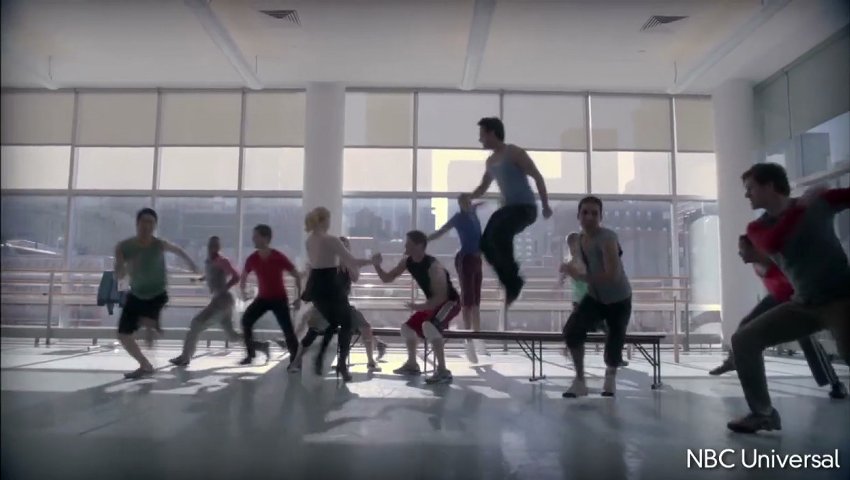 |
| Season 1 Marketing |
So what does it mean for a show that was notionally about Theatre; and about Theatre Production, sort of about Marilyn Monroe and sort of about an American Idol star and still trying to pry a Broadway Theatrical Production in real life out of the clutches of whatever it is that is going on here.
The best deconstruction I've seen of the situation in the real life production I've seen comes from Buzzfeed, that put out a delightful long read about the behind-the-scenes drama of the behind-the-scenes drama that led to the creatives changes between season 1 and season 2.
On Buzzfeed:
"How does a lovingly looked-after show with such high stakes for all involved become a joke? Smash is a case study: in how megalomania and television can clash unproductively; in how high expectations can crash immediately; and in how intense network and studio oversight can result in a paranoid show creator who causes workplace misery and, most importantly, a bad TV show."
You should read the whole thing, it helps understand a lot of the tension that is clear between the two takes on the concept that are clearly, quite diverse.
Smash isn’t just shallow, selfish, stupid, and narcissistic:
it’s a hundred percent sure that everyone else in the world is, too.
The other commentary that you absolutely must read on the subject of Smash is from Chris Braak, who I am quoting above and below:
From Braak's Excellent article "On Smash, and why it is the WORST."
Or else take Jennifer Hudson’s advice to Katherine McPhee, about her burgeoning career as a Broadway star: “Protect the work,” she says. “Someone’s always waiting to take you down, but if the work’s good, they won’t be able to.” If you cared about the work, then there might be times when you sacrificed of yourself in order to improve it: you might say, for example, “This show is good, but it would be better if it starred you, Megan Hilty,” and then you’d back out of the production. In that sense, if the work’s good then it doesn’t matter if someone else takes you down, because you’ve contributed to something that is greater than yourself, and it’s impossible for someone to take that away from you. But Smash does not draw a distinction between “the work” and “the star”. What Jennifer Hudson means by “the work” is “your meteoric rise to fame and fortune”; there’s nothing ennobling about this at all, nothing that even resembles the need for personal or artistic expression. Smash is about getting famous, full-stop.You may remember Braak from such elegant diagrams as The Perils of Empowerment if you read me regularly, you should be reading him as well. So, it seems clear that the show will be moving from being about "producing a show" (if it ever was) to "stories about people who produce shows" and mores the pity. If there's anything we could all use it's a genuinely interesting behind-the-scenes show that isn't entirely about sex or violence. (Who wants to bet me that a gun shows up on screen in this season?)
Whether it’s because the show is afraid that genuinely grappling with the human condition would be off-putting to the coveted 18-35 year old demographic, or because the people working on it do not themselves have any particular interest in art, the show is utterly disinterested in anything except the most banal aspects of Broadway. This kind of shallowness colors everything about the show, and it’s what makes the show ultimately toxic. That’s because Smash isn’t just a commercial enterprise on its own – tacky, yes, but everyone’s got to eat – it’s an enterprise that characterizes everything else it touches as equally hollow and grasping. It doesn’t just fail to understand the theater, or the people who work in it for reasons other than “I want to be a star”, it grossly misunderstands them, describes them according to its own distorted sense of self, and then parades around presenting them to the world.
 |
| Season 2 |
Mothers don't let your daughters grow up to be Gossip Girls.
While the character Ivy was the sex pot last season, it's clear that an early departure in the new showrunner's aesthetic. The new showrunner is making a concerted effort to go after a different demographic market with his CW approved vision of New York Glamour. Fame is central and everyone is considerably more sexed up than in the previous showrunner's vision.
Most visibly the difference in the Katherine McPhee character, for a reasonably conservative mid-western ingenue, in contrast to the seasoned Broadway vet, Meghan Tilly.
 |
| Katherine McPhee a Prim farm girl who covers up in Season 1 |
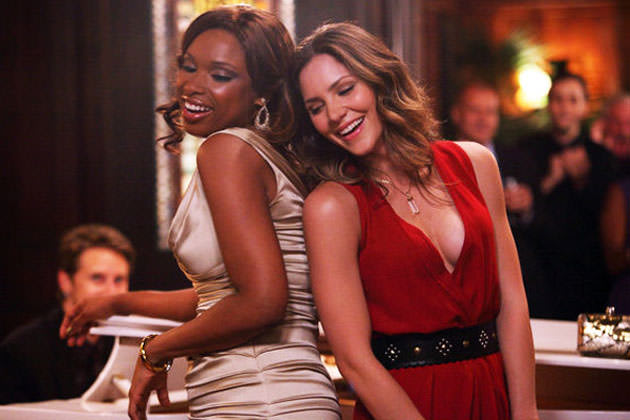 |
| Season 2 sees McPhee in a "Serena VanDerWoodsen" Cut Gown by the 30 minute mark. |
With any luck, we'll see scandals that inspire wit from the characters, who have often been one-note charcatures of desperation, earnestness or naivete.
"Did you Dress Warmly for Your Trip to the Moral High Ground?"What other stylistic changes will we see? My money is on "every episode contains at least one gala event that brings all the characters together in formal wear", "Fish out of water from Brooklyn" (who as a note, was introduced in episode 1) and "everyone ends up living together as a couple at least once before season 3". Other bets are in, including a pool on cancellation as the premiere was down 71% from the first season premiere how much time will the network give this show and how much time does the new showrunner have to turn it around... and will it be a hit among its new demographic target or will it bomb?
-Derek, the Sexual Predator Director
Subscribe to:
Comments (Atom)




